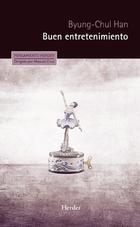
In this insightful essay, Byung-Chul Han analyzes and recounts, taking as reference Kant, Hegel, Nietzsche, Heidegger, Luhmann or Rauschenberg, the numerous forms of entertainment that have arisen throughout the history of the Christian Passion.
The history of the West is a story of the Passion: cultures with Christian tradition understand it as an unbearable and inevitable suffering that only in the end will be rewarded. The Passion, transferred to work and effort, has been opposed throughout history with the concepts of entertainment and leisure. However, at present, work and leisure are losing their impermeable barrier and intermingle: the working spaces are ergonomized and tasks are ludified, thus subjecting the game to production. This current totalization of entertainment may seem a decay for the society of the Passion. However, are the pure absurdity of the game really s...read more






